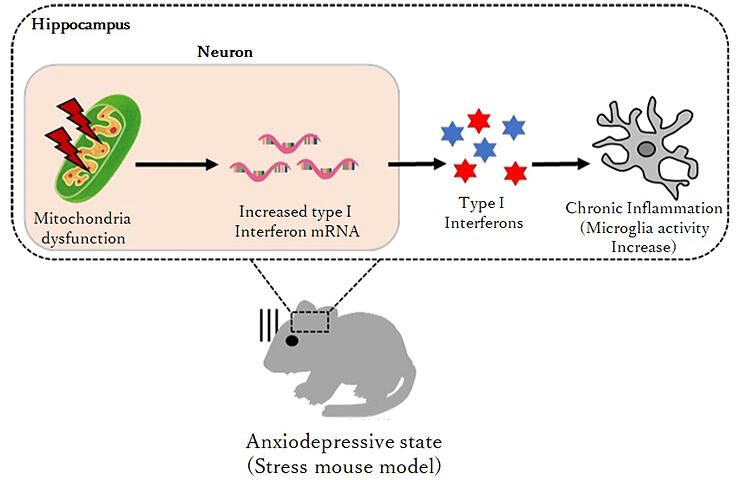Mental illnesses such as depression and anxiety disorder are increasing in the general population owing to the stressful daily life associated with the COVID-19 pandemic. Treatments for mental illness require long periods of time and contribute to a decline in the patient's quality of life (QOL). Approximately 30% of patients do not respond to the antidepressants and anti-anxiety medications prescribed for mental illnesses, and new treatments are needed.
The research group led by Professor Norimitsu Morioka, Assistant Professor Kazue Nakashima, Assistant Professor Yoki Nakamura, and Graduate Student Natsuki Yoshimoto of the Graduate School of Biomedical and Health Sciences at Hiroshima University has confirmed that mitochondria, which produce the energy needed for cellular function, are impaired in the hippocampus of the brain in mouse models of depression and anxiety disorder. The study has been published in Experimental Neurology.

Provided by Hiroshima University
Additionally, mitochondrial damage increases the level of interferon, an inflammatory substance, and this response has been shown to be important in the development of depression and anxiety disorder.
Mitochondria are found in almost all cells and are involved in energy production and other processes. Although mitochondrial dysfunction is known to be involved in the development of cancer and dementia, its involvement in the development of depression and anxiety disorder is not well understood. Using mouse models of depression and anxiety disorder, the research group has shown that mitochondrial damage occurs in the brain and hippocampus and that preventing this phenomenon improves depression and anxiety-like behaviors.
Additionally, the researchers have discovered for the first time that the hippocampus of mice of this mental illness model has an increased level of type I interferon (an inflammatory agent), which is associated with mitochondrial damage.
They also found that intranasal administration (i.e., given through the nasal cavity) of a neutralizing antibody against the type I interferon receptor improved the depression and anxiety-like behaviors in mice. Drugs that target mitochondria and type I interferon are expected to become new treatments for depression and anxiety disorder.
Journal Information
Publication: Experimental Neurology
Title: Mitochondrial dysfunction and type I interferon signaling induce anxiodepressive-like behaviors in mice with neuropathic pain
DOI: 10.1016/j.expneurol.2023.114470
This article has been translated by JST with permission from The Science News Ltd. (https://sci-news.co.jp/). Unauthorized reproduction of the article and photographs is prohibited.




